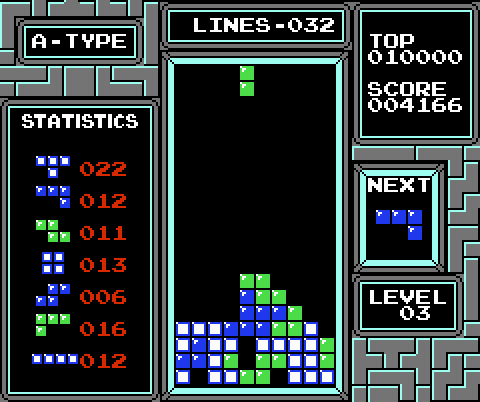After four decades in medicine, I retired from the active practice of primary care 15 months ago. I still get asked at least once a day: “Well, how’s retirement treating you?” My usual reply is that it is a learning process. A more accurate response would be that it is like playing Tetris, but with pieces that change shape and rotate unpredictably as they fall.
(For those not of a certain age, here is Tetris:

Before retirement, I was absurdly busy and therefore had to be pathologically efficient. My schedule was tightly packed and rather rigid. I resisted last minute changes because they involved so many other people and things, like rescheduling patients, moving meetings, and changing call arrangements. There was no ‘free’ time, and my limited discretionary time was precious so I treated it like the rare gift it was. My primary challenges were prioritizing what to do in my limited available slots, and finding a suitable open slot that was not absurdly far over the event horizon. Everything required long-term planning. (I tired of explaining to people that I needed to know the date for a weekend event six or more months in advance in order to have a chance of attending.) Although limiting, my schedule was predictable. I knew not to schedule anything on a night or weekend on call. I knew what days I had off months in advance. I knew that I had a Bylaws meeting to chair the second Tuesday noon of every month. I picked my vacation weeks six months in advance and then I (and my poor family) had to make the most of it. I lived this way for four decades by choice, and it became my reality.
(I owe my family and especially my wife both an apology and a huge debt of gratitude for putting up with this and keeping us together and functional. I volunteered. They were drafted.)
Retirement changed everything. My schedule was suddenly wide open by default. The biggest challenge of this wide open calendar has been resisting the seductive delusion that I have unlimited time and energy. A wise and successfully retired patient told me at our last visit together that I should not accept any long-term or repeated requests for at least a year, and only then begin to add ongoing commitments to my schedule. This was excellent advice which I (mostly) followed, though it has been hard to resist the temptation to commit to all those things I had been deferring for decades. I have spent more time with my children and grandchildren in the last 15 months than in the previous 3 years. I have spent more time this year Nordic asking than in the last several years combined. I went on more day hikes this past summer than in the past 3 summers combined. I have started - and finished - a number of small workshop woodworking projects. I have resumed taking computer coding courses on line. I have done some genealogy again. I have lost considerable weight. I am attempting to relearn how to cook. I play the guitar twice a month rather than once a year. On the whole, retirement has been wonderful. (Though I sorely miss my patients and my second family in my medical office.)
While I have had a great 15 months, it has not been easy. I feel like I am playing the mutated game of Tetris I described. I schedule most things on the fly, and in the short term. There are days when I get up and have no commitments, and can let the day evolve in real time. This is unquestionably good news. I can frequently participate in things I previously missed, like social events with college classmates or trips to visit children and grandchildren. I can take on bigger projects that I used to avoid because they were too big for my available slots. I can adjust my plans at the last moment, switching from indoor to outdoor projects based on weather or health. I can get involved in social or community initiatives.
The bad news is that I depended so much on my demanding schedule that over four decades I let my last minute planning and time management skills atrophy and lost the ability to be flexible, or comfortable with spontaneity. Here are some of the challenges I face:
- Things don’t get started because my open schedule removes any urgency or sense that I need to commit to a specific block of time. (That has been a major reason I haven’t been blogging for more than a year. I used to set aside an hour every morning before work, but after retirement I had so much time to write that I didn’t set aside specific times to write.)
- The lack of time pressure has allowed me to be less productive and efficient. I do not plan and prepare the way I did when I knew I had to finish a task before the bell rang. I’ll start something and part way through realize that I don’t have all the materials or tools and have to stop, or MacGyver it. I rarely try to double up on things (listening to a podcast while I do something else) and I now work at a more leisurely pace. I don’t stay up late and get up early, living in a sleep-deprived haze fueled by coffee. I even take naps!
- The lack of structure has resulted in intermittent frustrating outcomes, like scheduling a conference call late-morning on a day that looks pretty open, and only later discovering that I can’t fit other thinks into the slots before and after, or that I can’t ski during the best part of that day.
- Other people assume I have unlimited time (and energy) and put things on my schedule for me.
Lest anyone misunderstand, I love retirement. I only hope that I can master it over then next two or three decades.
